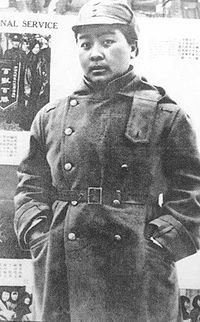- Ding Ling
-
For the ancient Siberian people, see Dingling.
Dīng Líng (丁玲) was the pseudonym of Jiǎng Bīngzhī (蒋冰之), also known as Bīn Zhǐ (彬芷) (October 12, 1904 - March 4, 1986), a Chinese woman author from Linli (临澧) in Hunan province.[1] She was awarded the Soviet Union's Stalin second prize for Literature in 1951.
Contents
Biography
Early life
Ding Ling was born into a gentry family in Hunan province. Her father's health was poor, and he died when Ding was three. Ding Ling's mother, who raised her children alone while becoming an educator, was Ding's role model, and she would later write an unfinished novel, titled Mother, which described her mother's experiences. Following her mother's example, Ding Ling became an activist at an early age.[2] Ding Ling early repudiated traditional Chinese family practices by refusing to marry her cousin who had been chosen to become her husband. She rejected the commonly accepted view that parents as the source of the child's body are its owners, and she ardently asserted that she owned and controlled her own body. She joined the Chinese Communist Party in 1932, a year after her husband, Hu Yepin, an impoverished worker, poet and Communist activist, had been executed in jail by the Kuomintang. By then, Ding Ling had become well known as the author of Miss Sophia's Diary (莎菲女士的日記, Shāfēi Nüshì de Rìjì), published in 1927, in which a young woman describes her unhappiness with her life and confused romantic and sexual feelings.
Political persecution
Active in the Communist revolutionary cause, she was placed under house arrest in Shanghai by the Kuomintang for a three year period from 1933-1936. Long after the defeat of Chiang Kai-Shek's Nationalist government she suffered even harsher treatment throughout her literary career because of the shifting Communist Party politics and power struggles. Always a political activist, in 1957 she was denounced as a "Rightist" and her fiction and essays were banned. She spent five years in jail during the "Cultural Revolution" and was sentenced to do manual labour on a farm for twelve years before being "rehabilitated" in 1978. In her introduction to Miss Sophie's Diary And Other Stories, Ding Ling explains her indebtedness to the writers of other cultures:
- "I can say that if I have not been influenced by Western literature I would probably not have been able to write fiction, or at any rate not the kind of fiction in this collection. It is obvious that my earliest stories followed the path of Western realism....A little later, as the Chinese revolution developed, my fiction changed with the needs of the age and of the Chinese people....Literature ought to join minds together...turning ignorance into mutual understanding. Time, place and institutions cannot separate it from the friends it wins... And in 1957, a time of spiritual suffering for me, I found consolation in reading much Latin American and African literature."
Later years
A few years before her death, she was allowed to travel to the United States where she was a guest at the University of Iowa's International Writing Program. She authored more than three-hundred works. After her "rehabilitation" many of her previously banned books such as her novel The Sun Shines Over The Sanggan River were republished and translated into numerous languages. Some of her short works, spanning a fifty year period, are collected in I Myself Am A Woman: Selected Writings Of Ding Ling.
Works
Collections
- Zai hei’an zhong [In the Darkness]. 1928.
- Zisha riji [Diary of a Suicide]. 1928.
- Yige nuren [A Woman]. 1928.
- Shujia zhong [During the Summer Holidays]. 1928.
- Awei guniang [The Girl Awei]. 1928.
- Shui [Water]. 1930.
- Yehui [Night Meeting]. 1930.
- Zai yiyuan zhong [In the Hospital]. 1941.
- Ding Ling wenji [Works of Ding Ling], Hunan Renmin Chubanshe. 6 vols. 1982.
- Ding Ling xuanji [Selected Works of Ding Ling], Sichuan Renmin Chubanshe. 3 vols. 1984.
Fiction
- Meng Ke. 1927.
- Shafei nüshi riji. February 1928, Xiaoshuo yuebao (short story magazine); as Miss Sophia's Diary, translated by Gary Bjorge, 1981.
- Weihu. 1930.
- Muqin. 1930; as Mother, translated by Tani Barlow, 1989.
- 1930 Chun Shanghai. 1930; as Shanghai, Spring, 1930, translated by Tani Barlow, 1989.
- Zai yiyuan zhong. 1941; as In the Hospital, translated by Gary Bjorge, 1981.
- Wo zai Xia cun de shihou. 1941; as When I Was in Xia Village, translated by Gary Bjorge, 1981.
- Taiyang zhao zai sanggan he shang. Guanghua shudian. September 1948; as The Sun Shines Over Sanggan River, translated by Gladys Yang and Yang Xianyi, Panda Books, 1984.
- Du Wanxiang. 1978; as Du Wanxiang, translated by Tani Barlow, 1989.
Further reading
- Chinese Writers on Writing featuring Ding Ling. Ed. Arthur Sze. (Trinity University Press, 2010).
See also
- Sanggan River
References
- Reference Guide to World Literature (3rd ed.). St. James Press. 2002. pp. 274–275. ISBN 9781558624900.
- Ebrey, Patricia. Cambridge Illustrated History of China. Cambridge University Press, June 13, 1996. ISBN 0-521-43519-6
- Solomon, Barbara H., "Other Voices, Other Vistas", A Mentor Book, March 1992
- ^ Britannica.com, Ding Ling
- ^ Feuerwerker, Yi-Tsi Mei (September 1984). "In Quest of the Writer Ding Ling". Feminist Studies (Feminist Studies, Vol. 10, No. 1) 10 (1): 65–83. doi:10.2307/3177896. JSTOR 3177896.
Categories:- 1904 births
- 1986 deaths
- 20th-century women writers
- Chinese-language writers
- Chinese women writers
- Female authors who wrote under male or gender-neutral pseudonyms
- People from Changde
Wikimedia Foundation. 2010.

